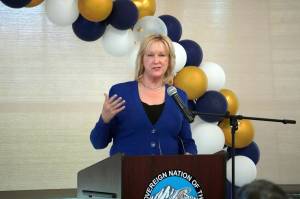Voices of Alaska: Alaska must do better for children in foster care
Published 7:03 pm Sunday, January 18, 2015
Alaskans are caring and generous. We should agree we can’t avoid our responsibility to improve life for the more than 2,300 foster youth for whom the state is the legal guardian, even in tight budgetary times. We become the legal guardian once the state removes a child from their home. We should treat foster youth as we’d want our own children treated.
We can’t just perform the first step, and remove them from a broken family. Once we separate a child from their parents we should do all that’s feasible so foster youth have real opportunity in life, a caring home, help with the trauma of having no family, and a fair shot at school and career success. No one would blame children who’ve been taken from their parents for no fault of their own.
There are good people in private and public agencies working hard to make a difference. But we can do better than the roughly 20 percent homelessness rate and 24 percent incarceration rate that exists for Alaska’s foster youth. Homelessness jumps closer to 40 percent if we count youth who “couch surf” with friends. From 2007-2011 when those youth were counted, that was the rate.
We should do better than only partially implementing the languishing 2011 study Governor Parnell commissioned on how to improve foster care. Shelving the bulk of these requested recommendations isn’t a solution.
In tight times we have to prioritize. Children are not a luxury project that should fall off the priority list. We need to work together to find efficient and effective solutions to make life better for youth, who often get uprooted between five, and sometimes more than 20 foster homes.
Both of us have pushed efficient reforms. We work to get donated laptops to foster youth so they can have a better chance to succeed in school. We’ve worked to get stores to volunteer to sell clothing to foster youth at discounted prices (more stores always welcome!). We’ve worked with the Legislature to help get volunteer mentors to youth so they have a stable adult in their lives as they transition from foster care. We’ve spoken to community groups to try to recruit needed foster and adoptive families.
The needed improvements that aren’t free will save money, and reflect our humanity. Youth failure, jail, prosecutor, public defender, probation officer, police, public assistance, and homelessness costs dwarf the cost of increasing success and jobs. That’s something many, but not enough youth achieve.
Fixing things is better than blaming people. Alaska’s leaves front line social workers with caseloads that are often double the national standard, or worse. It’s too easy to blame staff for doing a stressful job with not enough support. New social workers have such high caseloads they typically leave OCS within two years or less.
Add that to the reality that nearly twice as many Alaska youth suffer abuse and neglect than youth nationwide, and you start seeing why social workers need time to work with these young Alaskans.
One thing we can do is make sure Alaska does a better job getting youth a permanent home, by reunifying youth with their natural parents if that’s healthy, or by finding good family for them to live with. The national standard is to reunify youth, if safe, with their parents within 12 months, or to find a different permanent home within 24 months. We fail on both counts. Youth bounce too many years between unfamiliar homes with unfamiliar social workers.
We have a shortage of foster homes, so youth bounce between emergency homes, and homes that have too many foster youth. We need to do more to recruit strong foster and adoptive parents. Roughly 800 youth are currently waiting for adoptive homes.
And for youth who have suffered emotional trauma, and who need the stability of a home, we should make sure they are allowed to remain in foster care until age 21, the statutory limit Alaska and most states have. We terminate homes before age 21 for too many youth. Youth who’ve been traumatized have a greater need for a responsible adult in their lives, which they lose when foster care ends.
We need to implement the 2011 study the state commissioned, which shows we have a major shortage of help at OCS. Overburdening caseworkers so they don’t know the youth and families they work with isn’t workable.
Giving youth a real chance in life isn’t a partisan issue. Let’s work together to make 2015 the year we improve Alaska’s foster care system.
Rep. Les Gara (D-Anchorage) and Amanda Metivier, Executive Director of Facing Foster Care in Alaska, are both former foster youth and have been advocates for foster care reforms.




